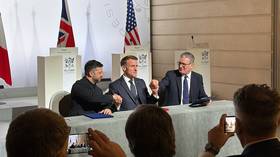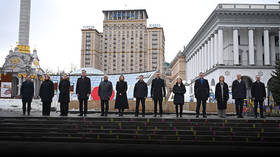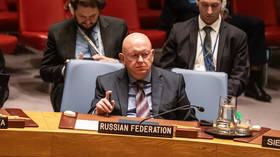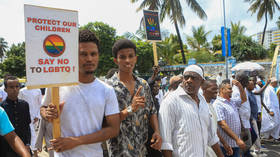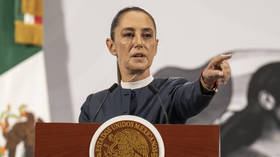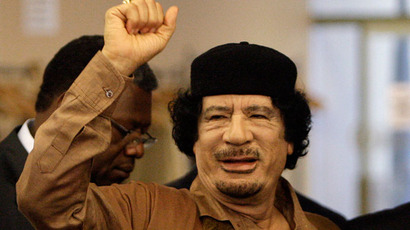Gaddafi son facing ‘show trial’, ICC & Libya at loggerheads
Almost two years after Libyan dictator Muammar Gaddafi was overthrown and killed, his son is to stand trial for alleged crimes against humanity. Saif al-Islam is set for a hearing in Libya; his lawyer says he faces an “entirely unfair” show trial.
If the proceedings continue in Libya, Saif al-Islam Gaddafi will
most likely be executed. Once seen as the most likely successor
to his father, he has been indicted by the ICC on war crimes
charges relating to the 2011 uprising. He faces charges of
harming state security and insulting Libya's new flag. On top of
this, Saif al-Islam is wanted by the ICC for the murder and
persecution of protestors during the 2011 uprising.
He was captured by local militia in the town of Ubari in November
2011, allegedly trying to flee the country.
“He’s facing a show trial, clearly, an entirely unfair trial;
trial in which he’s not able to get any defense witnesses to
testify on his behalf because they’ll be too terrified to
testify. And at the end of that he’s going to be executed,”
his lawyer John Jones told RT, adding that Gaddafi has been
held in “appalling conditions, regarding his mental
state.”
Earlier this month the International Criminal Court (ICC) has
ruled that Libya must extradite Gaddafi to The Hague. Libya is
defying the ICC ruling by refusing to hand him over and insisting
on trial at home. The ICC judges fear he won't receive a fair
trial there. He has already made two appearances in a Libyan
court.
The Court has reiterated its request to Libya to surrender Mr Saif-Al-Islam Gaddafi because the country “had not been sufficiently demonstrated that the domestic investigation cover the same case that is before the Court,” RT has found out from the ICC Public Affairs Unit.
“Since the ICC doesn’t have its own police force, it relies on States to enforce requests for arrest and surrender of ICC suspects. Libya has a legal obligation to surrender Saif Al-Islam Gaddafi to the ICC pursuant to UNSC resolution 1970 (2011) which referred the situation in Libya to the ICC,” the reply to RT read.
Furthermore Hague argues that that it “was not convinced by
the reasons provided as to why the surrender of Mr Gaddafi to the
Court would create, for the Libyan authorities, an irreversible
situation or one that would be very difficult to correct."
The court argues that the international court does “not
replace national criminal justice systems; rather, it complements
them. It can investigate and, where warranted, prosecute and try
individuals only if the State concerned does not, cannot or is
unwilling genuinely to do so.”
Furthermore, the court “cannot presume what a national Judge
would impose as sentence and what the process would be,” but
if an international trial is held “If the accused is found
guilty, Judges may impose a sentence of imprisonment for a
specified number of years not exceeding a maximum of thirty years
or life imprisonment.”
Former Gaddafi family lawyer Nick Kaufman believes that Saif
needs to be handed to the ICC on the basis of the UN Security
Council decision.
“The Security Council gave the ICC the mandate to investigate
crimes which were committed in Libya after the revolution. The
ICC carrying out the will and the wish of the international
community investigated the matter and issued two warrants to
arrests, one for Saif al-Islam and one for Abdullah Al Senussi.
Now, if the Libyans wish to try these two people, that is their
right but they have to request permission to do so from the
ICC.”
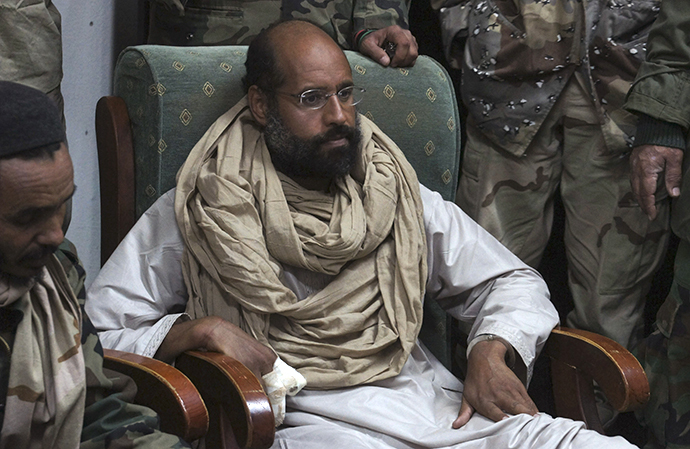
RT’s Paula Slier, who's been following the story, says the Libyan
government has challenged the right of the ICC to try safe. It
argues that Hague-based court has no jurisdiction because it only
intervenes if the local justice system is not functioning.
Meanwhile, those in Libya say that their justice system is
operating well.
Professor Yehudit Ronen, an expert on Libya, disagrees. She says
the country is in a state of collapse.
“I’m not sure that it will be right to assume that there is a
government in Libya today. There is no army, no police. Armed
militias are in control. Even if they give Saif a trial - the
Libyans always surprise us - so I can't really say how the trial
will go. I’m not even sure if it will begin and how just and
objective it will be,” Ronen told RT.
Gaddafi is being held in the town of Zintan, where he is facing
separate charges, accused of obtaining documents that threaten
national security.
When the Libyan rebels were fighting against Colonel Muammar
Gaddafi they proclaimed loudly that he and his family should be
court-martialed, Paula Slier, who was in the country at the time,
recalls.
Prior to the NATO-backed uprising in early 2011, the
London-educated Saif al-Islam Gaddafi was seen as a crucial
figure in building relations between Libya and the West.
The ICC would go on to issue an arrest warrant for him, his
father and his uncle, alleging they committed crimes against
humanity by suppressing the revolt of the Libyan people. Libyan
leader Muammar Gaddafi was brutally murdered by the rebels
following the capture of his hometown of Sirte.
The Chief ICC prosecutor confirmed informal talks about the
surrender of Saif Gaddafi, who was then captured by the rebels
and had to have parts of his fingers amputated. Libyan
authorities called for a trial in Tripoli, but the ICC demanded
he be handed over to The Hague. Four delegates from the Court
were detained in Libya for a month after attempting to get
documents to Gaddafi.




